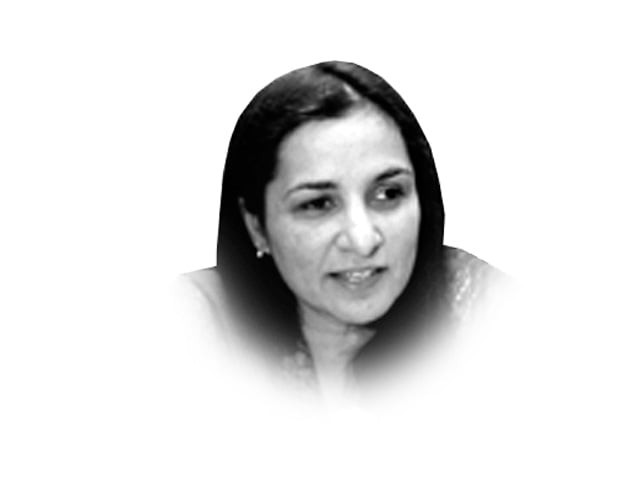An asymmetrical dialogue
While Nawaz has political support for engaging with Modi, the engagement track has to be symmetrical and sustainable

The writer is a political and security analyst, an anchor at Channel 24, and a fellow of Harvard University’s Asia Centre. She tweets @NasimZehra
Pakistan did not need the joint statement as badly as Narendra Modi did. The Ufa statement provided him with the cover he needed for making a U-turn after his year-long aggressive and irrational posture towards Pakistan. Nawaz Sharif relented, which resulted in the obviously asymmetrical Ufa statement that basically appeared to be drafted by the Indians. Pakistan’s foreign secretary was asked to review it and the prime minister was keen that no wrangling over the language takes place. Clearly, the foreign office troika of Sartaj Aziz, Tariq Fatemi and Aizaz Chaudhary obliged. An asymmetrical statement, leaving Pakistan’s concerns undocumented, was produced. The operational part of the statement, directly and in some cases minutely, accommodated India’s concerns about expediting the Mumbai trial. In contrast, Pakistan’s concerns were at best referred to in a veiled manner or went undocumented. The reference to Kashmir was submerged in the term “outstanding issues”. In a strange display of bonhomie, officials from the two countries read the statement jointly.
Nawaz Sharif has put his political capital at stake by opting for this controversial, asymmetrical statement, especially in an environment where the Modi government took unprecedented steps to shrink the space for dialogue and conflict-resolution. Beginning with the abrupt August 2014 decision to call off the foreign secretary-level talks, key members of the Modi cabinet opted for aggressive posturing through statements hitting out at Pakistan, and through issues raised with third parties, whether it was the complaint that India raised against the China-Pakistan Economic Corridor with the Chinese, or the attempt to push for UN Security Council sanctions on Pakistan, or the highlighting with great pride, India’s military role in the 1971 war and in the subsequent break-up of our country.
The Ufa statement is obviously proving to be a hard sell. The prime minister’s men at the foreign office are busy holding pressers to explain how Kashmir will always be the central issue in any Pakistan-India dialogue and that the term, “outstanding issues” in the statement encompasses Kashmir. They insist Kashmir figured in the talks between the two prime ministers. Foreign office officials, we are told, have documented this in the official record of the meeting. Sartaj Aziz, especially, has been busy giving interviews and holding pressers to respond to the widespread criticism of the statement. In his opening statement in the July 13 presser, Aziz stated, “Kashmiris have suffered for three generations now. Their right to self-determine their destiny has not been granted….” Aziz listed all the issues that were discussed in the Nawaz-Modi meeting, but he has been unable to address the criticism regarding why Pakistan’s concerns remained unmentioned in the joint statement.
Aziz’s opening statement provides explanations on three important issues. On Kashmir, he reiterates that there will be a back channel dialogue. Interestingly, for this, Sharif and Modi have decided to return to the 1999 engagement mode on Kashmir. However, unlike 1999, when the BJP for the first time decided to discuss the Kashmir dispute, and which was reflected in the Lahore Declaration, Sharif has been accepting of the silence on Kashmir in the joint statement.
The second issue Aziz touched upon was on voice samples, which the operational part of the statement implies will be given to India. The adviser states that “on Mumbai trial case, our view has been, and was so in this meeting as well, that we need more evidence and information to conclude the trial”. Hence, contrary to India’s expectation and as reflected by that country’s media that Pakistan will be providing Zakiur Rehman Lakhvi’s voice samples, it is likely that it will be Pakistan which would be seeking the samples from India. Lakhvi’s lawyer, invoking Pakistani law, has already announced that his client won’t be providing his voice sample. Questions have been raised regarding India’s demand for voice samples when it has already concluded the case and the prime suspect Ajmal Kasab has been hanged.
The third important point explained by Aziz is that the joint statement merely refers to the holding of routine meetings between the Directors General of Rangers and Military Operations and their Indian counterparts. His explanation implies that no meetings, other than routine ones outlined in the 2003 ceasefire agreement, are being planned or proposed.
Now, with this asymmetrical statement having queered the pitch against Sharif, the conduct and the content of the New Delhi meeting between the two national security advisers will decide how far Pakistan can travel on the path of dialogue. Any dialogue process that fails to factor in Pakistan’s concerns will obviously be short-lived. Sharif’s task will now be to convince the opposition and Pakistan’s policy stakeholders that more than what is reflected in the Ufa statement was discussed and agreed upon, and that in fact, the dialogue, like the statement, will not be asymmetrical.
There is consensus in Pakistan over improving relations with India and on this issue Sharif has not been risk-averse, even with a hardliner like Modi. While he has political support for engaging with Modi, the engagement track has to be symmetrical and sustainable. For that, simultaneous engagement on all disputes, including those of security, political and economic nature, is a must.
Published in The Express Tribune, July 16th, 2015.
Like Opinion & Editorial on Facebook, follow @ETOpEd on Twitter to receive all updates on all our daily pieces.















COMMENTS
Comments are moderated and generally will be posted if they are on-topic and not abusive.
For more information, please see our Comments FAQ